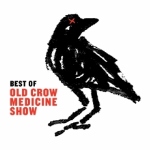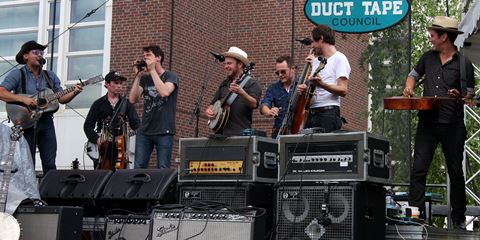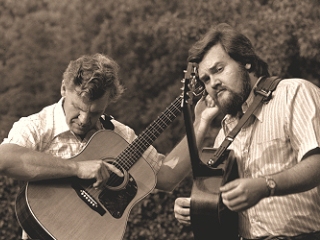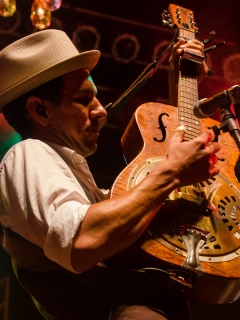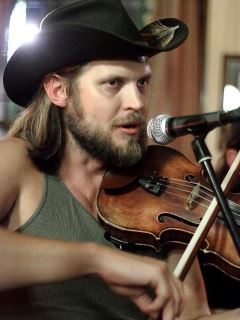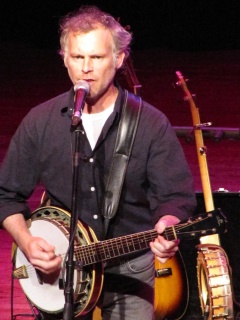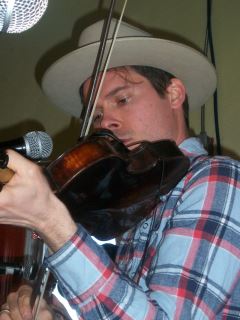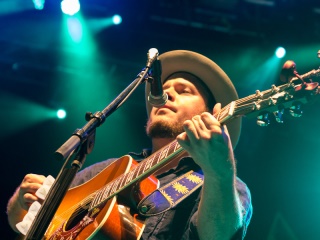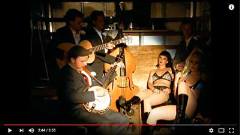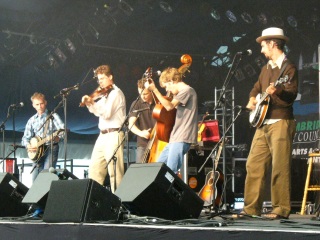FolkWorld #62 03/2017
Best of Old Crow Medicine Show
Old Crow Medicine Show is an Americana string band based in Nashville, Tennessee, that has been recording since 1998. They were formally inducted into the Grand Ole Opry on September 17, 2013. Their ninth album, Remedy, released in 2014, won the Grammy Award for Best Folk Album. The group's music has been called old-time, folk, and alternative country. Along with original songs, the band performs many pre-World War II blues and folk songs.
“The twentysomethings in Old Crow Medicine Show marry old-time string music and punk swagger.”
Rolling Stone
The Old Crow Medicine Show started busking on street corners and ended up playing Merle Fest and the Grand Ole Opry,
winning audien- ces with their bound- less energy and spirit.
19 years since these humble beginnings the Old Crows
have won two Grammy Awards: Best Folk Album for Remedy (2014) and Best Long Form Music Video for Big Easy Express (2013).
Additionally, their classic single, Wagon Wheel, received a Platinum certification for selling over 1,000,000 copies.
"Best of Old Crow Medicine Show", Nettwerk, 2017
Bluegrass musician Doc Watson discovered the band while its members were busking outside a pharmacy in Boone, North Carolina, in 2000. With an old-time string sound fueled by punk rock energy, it has influenced acts like Mumford & Sons and contributed to a revival of banjo-picking string bands playing Americana music—leading to variations on it.
The band released five studio albums—O.C.M.S. (2004), Big Iron World (2006), Tennessee Pusher (2008), Carry Me Back (2012), and Remedy (2014). Their song "Wagon Wheel", written by frontman Ketch Secor through a co-authoring arrangement with Bob Dylan, was certified platinum by the Recording Industry Association of America in April 2013 and has been covered by a number of acts, including Darius Rucker, who made the song a top 40 hit.
The band was featured along with Edward Sharpe and the Magnetic Zeros and Mumford & Sons in the music documentary Big Easy Express, which won a Grammy Award for Best Long Form Music Video in 2013. They performed on the Railroad Revival Tour across the U.S. in 2011. They appeared at the Stagecoach Festival 2013 and multiple times at other major festivals, e.g., Bonnaroo Music Festival, MerleFest, Telluride Bluegrass Festival, Hardly Strictly Bluegrass Festival, and Newport Folk Festival.
They make frequent guest appearances on A Prairie Home Companion with Garrison Keillor. The group received the 2013 Trailblazer Award from the Americana Music Association, performing at the Americana Honors & Awards Show.
Publishing administrator Downtown Music Publishing represents the works of Old Crow Medicine Show.
History
Early
Ketch Secor and Critter Fuqua first met in the seventh grade in Harrisonburg, Virginia and began playing music together. They performed open mics at the Little Grill diner, as did Robert St. Ours who went on to found The Hackensaw Boys. Secor's early influences included "driving up to Mt. Jackson, VA to the bluegrass Saturday night in the summer. And going up to Davis and Elkins College to participate in the Old Time Music week there, and meeting guys like Richie Stearns." Secor formed the Route 11 Boys with St. Ours and his brothers, and performed often at Little Grill.
Willie Watson first met Ben Gould in high school in Watkins Glen, New York (Schuyler County), and began playing music together. Both Watson and Gould dropped out of school and formed the band The Funnest Game. Their brand of electric/old-time was heavily influenced by the old-time music scene prominent in Tompkins and Schuyler County, New York, including The Horse Flies and The Highwoods Stringband.
Fuqua, school friend and future bandmate, first brought home a Bob Dylan bootleg from a family trip to London containing a rough outtake called "Rock Me, Mama" (from the "Pat Garrett and Billy The Kid" soundtrack sessions) and passed it to Secor. Not "so much a song as a sketch, crudely recorded featuring most prominently a stomping boot, the candy-coated chorus and a mumbled verse that was hard to make out", the tune kept going through Secor's mind. A few months later, while attending Phillips Exeter Academy in New Hampshire, and "feeling homesick for the South," he added verses about "hitchhiking his way home full of romantic notions put in his head by the Beat poets and, most of all, Dylan." Dylan was a major influence on the young musician, as he puts it:

 Bob Dylan @ FolkWorld:
FW#20
Bob Dylan @ FolkWorld:
FW#20,
#34,
#38,
#39,
#40,
#44,
#45,
#45,
#46,
#47,
#54,
#60,
#61
www.bobdylan.com
"I listened to Bob Dylan and nothing else. Nothin' but Bob for four years. It was like schooling. Every album and every outtake of every album and every live record I could get my hands on and every show I could go see live. I was a teenager who was really turned on to Bob."
The Dylan outtake, generally titled "Rock Me Mama", came out of recording sessions for the Pat Garrett and Billy the Kid movie soundtrack (1973) in Burbank, California. Secor says it ". . was an outtake of something he had mumbled out on one of those tapes. I sang it all around the country from about 17 to 26, before I ever even thought, 'oh I better look into this.'"
When Secor sought copyright on the song in 2003 to release it on O.C.M.S. in (2004), he discovered Dylan credited the phrase “Rock me, mama” to bluesman Arthur “Big Boy” Crudup, who likely got it from a Big Bill Broonzy recording. As Secor says: "In a way, it's taken something like 85 years to get completed." Secor and Dylan signed a co-writing agreement, and share copyright on the song; agreeing to a "50-50 split in authorship."
Secor later met Dylan's son, Jakob, who said "it made sense that I was a teenager when I did that, because no one in their 30s would have the guts to try to write a Bob Dylan song." The song would be an early entry in the group's catalog when it formed a few years later. Officially released twice, on an early EP and their second album ("O.C.M.S." in 2004), the song would become the group's signature song—going gold in 2011 and platinum in 2013.
Upstate New York/Canada/North Carolina
After the breakup of the Route 11 Boys, Secor attended Ithaca College. He brought Fuqua up to New York State, where they met Willie Watson. Watson dissolved The Funnest Game and they assembled players all around Ithaca, New York "where there is a very lively old-time music scene", including Kevin Hayes. They recorded an album that they could sell on the road—a cassette of ten songs called Trans:mission. Fuqua says of the influence of that region . .
'Ithaca and that surrounding area was a big influence on us. We wouldn't be here without a lot of the people we met there, like Richie Stearns, the Red Hots and Mac Benford. All those old-time banjo players brought the music from the South back up to New York, and it was kind of a hotbed.'
The group left Ithaca for their Trans:mission tour in October 1998. They busked their way west across Canada and circled back east again in the Spring of 1999 when they moved into a farmhouse on Beech Mountain, near Boone, North Carolina. They were embraced by the Appalachian community, and their repertoire of old-time songs grew as they played with local musicians."
Busking break
One day the group were busking outside a pharmacy called Boone Drug—"playing on Doc's old corner" where he'd "started playing in the 1950s" on King Street in Boone, North Carolina—when the daughter of folk-country legend Doc Watson (d. May 29, 2012) heard them. Certain her father would be impressed, she led the blind musician over for a listen. The group "struck up 'Oh My Little Darling', a well-known old-time song they thought Doc would like." When they finished, he said: "Boys, that was some of the most authentic old-time music I've heard in a long while. You almost got me crying." Doc invited the band to participate in his annual MerleFest music festival in Wilkesboro, North Carolina (for 2000).
To Secor: "That gig changed our lives and we look to it as a pivotal turning point as Old Crow Medicine Show. He and Fuqua have written a song "about Doc Watson. About being on the corner in Boone and him discovering us. It honors Doc and the high country blues sound."
Busking has "always been our heart and soul," claims Secor. "Our performance comes out of all those years spent cutting our teeth on the street corner." The earliest beginnings of the group involved busking in the Northeast U.S., attracting fresh talent. Guitjo player Kevin Hayes—originally from Haverhill, Massachusetts—was in Bar Harbor, Maine raking blueberries when he encountered Secor "on the street in front of a jewelry store playing the banjo." Bassist Morgan Jahnig joined the group as a result of a "random" encounter with early Old Crow performing on the streets of Nashville in 2000. Guitarist Gill Landry first met the group in 2000 while both were street performing during Mardi Gras in New Orleans, joining full-time in 2007.
To promote Carry Me Back Home (2012), the group did a series of "guerilla" shows around Nashville, including busking in front of the Ryman Auditorium where they performed "Sewanee Mountain Catfight" for an "unsuspecting crowd of tourists."
Grand Ole Opry
The big busking break led to the act's relocation to Nashville in October 2000. At MerleFest, Secor explains, Sally Williams "from the Grand Ole Opry . . invited us to participate in some summer music events at the Grand Ole Opry House doing our street act, our busking, and that's why we came to Nashville . ." Williams first booked them for "an Opryland Plaza outdoor show." In Nashville they were "embraced and mentored" by Marty Stuart, the president of the Grand Ole Opry, who first spied the group at the Nashville-area Uncle Dave Macon Days festival and added them to his "Electric Barnyard old-fashioned country variety package show bus tour" with acts like Merle Haggard, Connie Smith, and BR5-49. Soon they were opening for "everyone from Loretta Lynn and Dolly Parton to Ricky Skaggs and Del McCoury . ."
The group made their Grand Ole Opry debut at the Ryman Auditorium, "The Mother Church of Country Music", in January 2001. Given just four minutes on stage, they played their original "Tear It Down"—a "singing jug-band romp about punishing infidelity"—and received a "rare first-time-out standing ovation, and a call for an encore." In August 2013, Stuart unexpectedly appeared onstage at the Ohio Theatre in Cleveland, where the group was performing, to invite them to become official members of the Opry. They were formally inducted at a special ceremony at the Grand Ole Opry House in Nashville, September 17, 2013.
Nettwerk
Shortly after their Opry debut, the group signed with Bobby Cudd at Monterey Peninsula Artists, who also represented Robert Earl Keen, the Dave Matthews Band, Chris Isaak, Aerosmith, and Fiona Apple. They went on their "first real tour" May 2001, opening for the Del McCoury band. Appearances at the 2003 South by Southwest (SXSW) in Austin—a "scene" that's "all about getting behind young artists", as Secor puts it—led to the group being signed by Nettwerk, securing their recording future for the next several years. Their first Nettwerk offering, Old Crow Medicine Show in 2004 (popularly known as O.C.M.S.), was produced by Dave Rawlings and mixes "old blues and jug band music with originals that fit smoothly into the tradition"—including the Fuqua "Take 'em Away" and Secor "Wagon Wheel". More than 100,000 copies of O.C.M.S. were sold, behind a "rigorous tour schedule and a memorable live show"; what CMT regarded as "an impressive number for a new band that didn't know much about record deals and everything that goes with it."
Big Iron World (2006), another Rawlings production, added a sense of urgency on new songs like "I Hear Them All". They recorded Tennessee Pusher (2008) in Hollywood with producer Don Was, "rocking harder" with "Alabama High Test" and "Methamphetamine". Secor says the band "figured they'd take some leftover material from the first album, add a few traditional songs and suddenly have a new record." But, he says . .
". . it wasn't that easy. Pretty soon, after we realized that that wasn't going to work that way, the gods up above started sending down some lightning bolts of good music and we were able to collect some new material—write some and craft some—that has made the record what it is."
Starting with an appearance on radio show A Prairie Home Companion with Garrison Keillor in 2004 they've had a recurring engagement with the show, including several appearances in the show's home state of Minnesota and special live shows—including the Hollywood Bowl and a New Year's Eve show at the Ryman. They've participated in three of the show's Cinecasts, all from the Fitzgerald Theater in Saint Paul, "seen on movie screens across North America."
The Big Surprise Tour featuring Old Crow, Gillian Welch and Dave Rawlings, the Felice Brothers, and Justin Townes Earle kicked off in Hampton Beach, New Hampshire August 2009. The "nine-stop tour" included shows in Knoxville, Nashville, Boston, New York and Philadelphia—and "mark(ed) the first major showcasing of the Dave Rawlings Machine."
In April 2011 the group joined Mumford and Sons and Edward Sharpe and the Magnetic Zeros on The Railroad Revival Tour, a tour inspired by the Festival Express tour across Canada in 1970 that included Buddy Guy, Janis Joplin, The Grateful Dead, and The Band. Traveling exclusively in vintage rail cars, the three bands performed in six "unique outdoor locations" over the course of a week starting in Oakland, California. They appear in the musical documentary about the tour, Big Easy Express directed by Emmett Malloy, which premiered March 2012 at the South by Southwest Film Conference and Festival (SXSW Film) in Austin, Texas—winning the Headliner Audience Award.
Big Easy Express won the Grammy Award for Best Long Form Music Video in 2013.
Hiatus/Founder returns
In August 2011, the group announced they were on hiatus, cancelling three shows scheduled for the following month, with "little word from the band on whether there would continue to be a band." Original member Willie Watson left in Fall of 2011, a couple months before Fuqua returned.
Recording of their next album had been largely done before the break.
Founding member Fuqua rejoined the group in January 2012, after leaving in 2004 "initially leaving to go to rehab for his drinking, then staying out to attend college." Cory Younts, who left Old Crow a few months into 2012 to perform in Jack White's backup band Los Buzzardos (or The Buzzards) on world tour to support White's album Blunderbuss, returned to the group in 2013.
Carry Me Back (2012)
Carry Me Back was released July 17, 2012 on According to Our Records (or ATO Records). Founded by Dave Matthews and his business manager Coran Capshaw in 2000 as a division of RCA Records. Recorded at Sound Emporium Studios in Nashville, the album was produced by Ted Hutt who had worked with Gaslight Anthem, Dropkick Murphys, and Flogging Molly. The name derives from "Carry Me Back to Old Virginny”, former official state song of Virginia.
The song "Levi" is "about a soldier who grew up in the wild hillbilly woods of Virginia." First Lieutenant Leevi Barnard—from Ararat, Virginia—on his first tour of duty overseas with the National Guard, was "killed by a suicide bomber" in Baghdad’s Dora Market in 2009. Near the end of the NPR broadcast, where Secor first heard the story in 2009, several of the late lieutenant's friends, part of the funeral congregation, "broke into Barnard's favorite song" . . "Wagon Wheel". "Genevieve" by Landry is "an evocative eulogy of a Creole queen who steals a young man's heart."
The album "sold over 17,000 copies in its debut week, landing at #22 on the Billboard Albums Chart, leading to both the band's best ever sales week and their highest ever charting position. It was #1 on both the Bluegrass and Folk charts and is the #4 Country album in the nation" (as of July 31, 2012). To promote the album, the group played five unannounced shows at historical locations around Nashville (including one surprise show in front of Ryman Auditorium) and toured July/August 2012 with The Lumineers, The Milk Carton Kids, and Pokey LaFarge and the South City Three visiting such cities as: Louisville, Cincinnati, Nashville, Richmond, Washington, D.C., Philadelphia, New York, Boston, and Atlanta.
American Songwriter, and London-based The Independent and The Financial Times, each gave the album 4 out of 5 stars. To Secor the album "is as close as that original inspiration to be in a band as when we first got started. It's very much the root of our sound."
"Carry Me Back exploits a kaleidoscopic galaxy of joyous old-timey string sounds updated for the 21st century."
— Dave Dawson, Nu Country
Chance McCoy—who grew up in Harpers Ferry, West Virginia, but was born in Washington, D.C.—joined just prior to the Carry Me Back promotional tour in 2012. As a teacher of old-time music at Augusta Heritage Center of Davis & Elkins College in Elkins, West Virginia he'd attracted the attention of the group who "wanted to get Old Crow back together and on the road again." "He got the gig" because Secor "knew that anyone who worked at Augusta knew all about old-time music."
Remedy (2014)
The group's ninth album, Remedy, was released in July 2014 by ATO Records and produced by Ted Hutt—who produced their previous studio record. The album features a collaboration with Bob Dylan, “Sweet Amarillo”, and ballads “Dearly Departed Friend” and “Firewater”, the latter written by Fuqua. Remedy won the Grammy Award for Best Folk Album in 2015. This award—created in 2012 to address "challenges in distinguishing between" previous category Best Contemporary Folk Album and Best Traditional Folk Album musical genres—was won by Guy Clark the previous year and Béla Fleck & Abigail Washburn the next. Also nominated in 2015 were Mike Auldridge, Jerry Douglas & Rob Ickes for Three Bells, Alice Gerrard for Follow the Music, Eliza Gilkyson for The Nocturen Diaries, and Jesse Winchester (1944-2014) for A Reasonable Amount of Trouble.
Musical style
"The sound is invigorating on their recordings, but at a live show the fiddle, banjo, and harmonica are practically on fire, creating a crazy, addictive mix of some of the best traditional music America has to offer with the intensity of a modern-day rock show."
Elizabeth Pandolfi, Charleston City Paper
Variously described as old-time, Americana, bluegrass, alternative country, and "folk-country", the group started out infusing old Appalachian sounds with new punk energy. Country Music Television notes their "tunes from jug bands and traveling shows, back porches and dance halls, southern Appalachian string music and Memphis blues." Gabrielle Gray, executive director of the International Bluegrass Music Museum—who sponsors ROMP: Bluegrass Roots & Branches Festival, which Old Crow headlined one night in 2012—holds the group "is in the direction of progressive bluegrass." Their live touring show has been described as a "folk-bluegrass-alt-country blend."
"We just knew we wanted to combine the technical side of the old sound with the energy of a Nirvana," states Fuqua. Starting from old-time music in the Appalachian hills, the group found themselves "making a foray into electric instruments and 'really knocking up the rock 'n' roll tree' on their 2008 release 'Tennessee Pusher'." On the documentary "Big Easy Express" about the Railroad Revival Tour with Mumford & Sons and Edward Sharpe and the Magnetic Zeros they "practice(d) a complementary variation of folk" bringing "a pleasingly smoky amalgam of country, bluegrass, and blues." With "Carry Me Back" (2012) they've "circled back to the original sound that so excited (Secor) and Fuqua as kids . . full of old-timey string sounds updated for the 21st century — sing-a-longs that lift the soul, ballads that rend the heart and a few moments of pure exhilaration."
Songwriting
Early on the group didn't perform songs they'd written, instead drawing on a storehouse of pre-war jug band, string band, minstrel show, blues and folk fare. As with other young groups in the genre, driven by all that punk music energy, they played this old material "fast and hard". When they started writing original material they distinguished themselves "from the crowded field of New Wave string bands as genuine stars. And both groups have done it by writing new songs more ambitious than mere rewrites of old hillbilly and blues numbers." Songs they write often have a socially conscious theme, such as "I Hear Them All", "Ways Of Man", "Ain't It Enough", and "Levi".
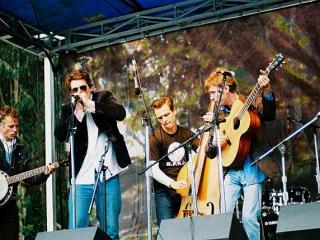
"It takes a lot to figure out how to keep one foot in old time and one foot in all time. It's a bit of a dance to be rooted and modern at the same time. I think we've figured out how to write those songs that sound like they were sung by some campfire 85 years ago, but sound good blasted from the stereo of a Ford Ranchero in a Burger King parking lot somewhere outside of Enid."
Ketch Secor
Secor admits to developing "the habit of writing what he calls 'stolen melody songs'"—in much the same way he'd created "Wagon Wheel", carrying on in the folk tradition—"like when he penned fresh, war tax-themed lyrics to a tune that had already passed through other wholesale re-writes during its descent from old-time Scots-Irish balladry." Dave Rawlings states: "I've always thought that a really important thing that the Old Crow Medicine Show brought to the table was new songs—some reinterpreted old ones, some really nicely written and brand new—with the old flavor, but also with that vitality."
In August 2014, Downtown Music Publishing signed a worldwide publishing agreement with Old Crow Medicine Show. This agreement covers all five of the band's studio albums, including 'Remedy'.
Influences
An early Secor influence was John Hartford who performed for his first grade class in Missouri, making him want "to play the banjo after that;" and the first song he ever learned to play was Tom Paxton's "Ramblin' Boy". Guns N' Roses was Fuqua's "first influence": when they released Appetite for Destruction (1987), while he was in seventh grade, he knew he wanted to be a musician. He also claims AC/DC and Nirvana as influences "and then into blues and then into more obscure fiddlers. Some Conjunto from down in San Antonio." "Take 'Em Away", written when he was 17, is "loosely based on Mance Lipscomb, a blues singer and sharecropper from Navasota County" who he says "was a big influence on me."
Naming his major influences, Secor states: "Certainly, Bob Dylan . . Bob Dylan . . Bob Dylan. More than anything else. More than any book or song or story or play. The work and the recorded work of Bob Dylan. It's the most profound influence on me. And then the other people that really influenced me tend to be the same people who influenced Bob Dylan." Fuqua concurs on Dylan's influence:
"He's a link to Woody Guthrie, who's a link to an even earlier form of American music history. He's . . a great doorway for all sorts of artists because he's not just folk, or just rock. . . I think bands like us, Mumford and Sons, and Gillian Welch and David Rawlings are sort of doing what he has done before, in that we take our own experiences and observations and put them into songs made of traditional, American roots form. That form is still a great vehicle for songs, whether the song is about love, the Iraq War or anything else."
The Dylan doorway led to the first recordings of the New Lost City Ramblers, the Jim Kweskin Jug Band, Canned Heat, The Lovin' Spoonful, Dylan and The Band in the basement, and the Grateful Dead.
Impact
"While it would be going a bit far to say Old Crow sparked a full-blown folk revival, these guys have contributed mightily to a major shift in youthful attitudes toward ownership, authenticity and what it means to feel included in a musical experience: lyrics don't have to be strict autobiography to connect; songs don't have to be entirely original to showcase originality; and younger generations need not turn up their noses at music that doesn't treat them like they're at the center of the universe."
Jewly Hight, American Songwriter
When Secor, Fuqua, and company first got together "old-timey pickers their age were few and far between. Modern rock was still a force to be reckoned with. Now hard-driving string bands are where it's at." Fuqua recalls:
"When we started the band in '98, you didn't see anybody our age playing banjos or upright basses or fiddles, or playing this music. I mean, you did if you went to the fiddle festivals at Mt. Airy or in Galax, Virginia. But . . now you throw a stone in any direction . . you'll hit someone in a band who's . . playing banjo or playing these old-time tunes."
To Americana Music Association (AMA) President Jed Hilly, the historic path of Americana music passes through the group: "The baton is passed from Emmylou Harris to Gillian Welch and David Rawlings to Old Crow Medicine Show to the Avett Brothers." Emmylou Harris was, in fact . .
". . among the gateway artists who helped Mumford and bandmates Ben Lovett, Ted Dwane and Winston Marshall discover their love for American roots music. It started with the 'O Brother, Where Art Thou?' soundtrack . . That eventually led them to the Old Crow Medicine Show and then deep immersion in old-timey sounds from America's long-neglected past."
"You can't swing a cat these days without hitting a hipster with a banjo in his hands. At least part of the credit for this phenomenon goes to Old Crow Medicine Show."
Chrissie Dickinson, Chicago Tribune
Marcus Mumford, front man of Mumford & Sons, recognizes the group's influence: "I first heard Old Crow's music when I was, like, 16, 17, and that really got me into, like, folk music, bluegrass. I mean, I'd listened to a lot of Dylan, but I hadn't really ventured into the country world so much. So Old Crow were the band that made me fall in love with country music." Mumford acknowledges in "Big Easy Express", Emmett Malloy's "moving documentary" about the vintage train tour they'd invited Old Crow to join them on, that "the band inspired them to pick up the banjo and start their now famous country nights in London."
Old Crow received the 2013 Trailblazer Award from the Americana Music Association.
From Wikipedia, the free encyclopedia
[en.wikipedia.org/wiki/Old_Crow_Medicine_Show].
Wikipedia® is a registered trademark of the Wikimedia Foundation, Inc., a non-profit organization.
Text is available under the Creative Commons Attribution-ShareAlike License.
Date: February 2017.
Photo Credits:
(1) 'Best of Old Crow Medicine Show', (3) Bob Dylan,
(4) Doc Watson, (10) 'Wagon Wheel' Video (unknown/website);
Old Crow Medicine Show:
(2) A Prairie Home Companion 40th Anniversary (by Jonathunder/Wikipedia);
(5) Gill Landry, (9) Chris 'Critter' Fuqua @ 9:30 Club in Washington, D.C., 2012
(by ChunkyGlasses/Wikipedia);
(6) Chance McCoy @ The Birkbeck Tavern in Leyton, London
(by Jeff G/Wikipedia);
(7) Kevin Hayes @ Tivoli Theatre in Chattanooga, Tennessee, 2010
(by Sean Russell/Wikipedia);
(8) Ketch Secor @ Harrisonburg, Virginia, 2012
(by Michael J. Farrand/Wikipedia);
(11) Cambridge Folk Festival, 2005 (by Andy/Wikipedia);
(12) Hardly Strictly Bluegrass Festival in San Francisco, 2004
(by Ron Baker & Craig Williams/Wikipedia).
FolkWorld - Home of European Music
 Layout & Idea of FolkWorld © The Mollis - Editors of FolkWorld
Layout & Idea of FolkWorld © The Mollis - Editors of FolkWorld